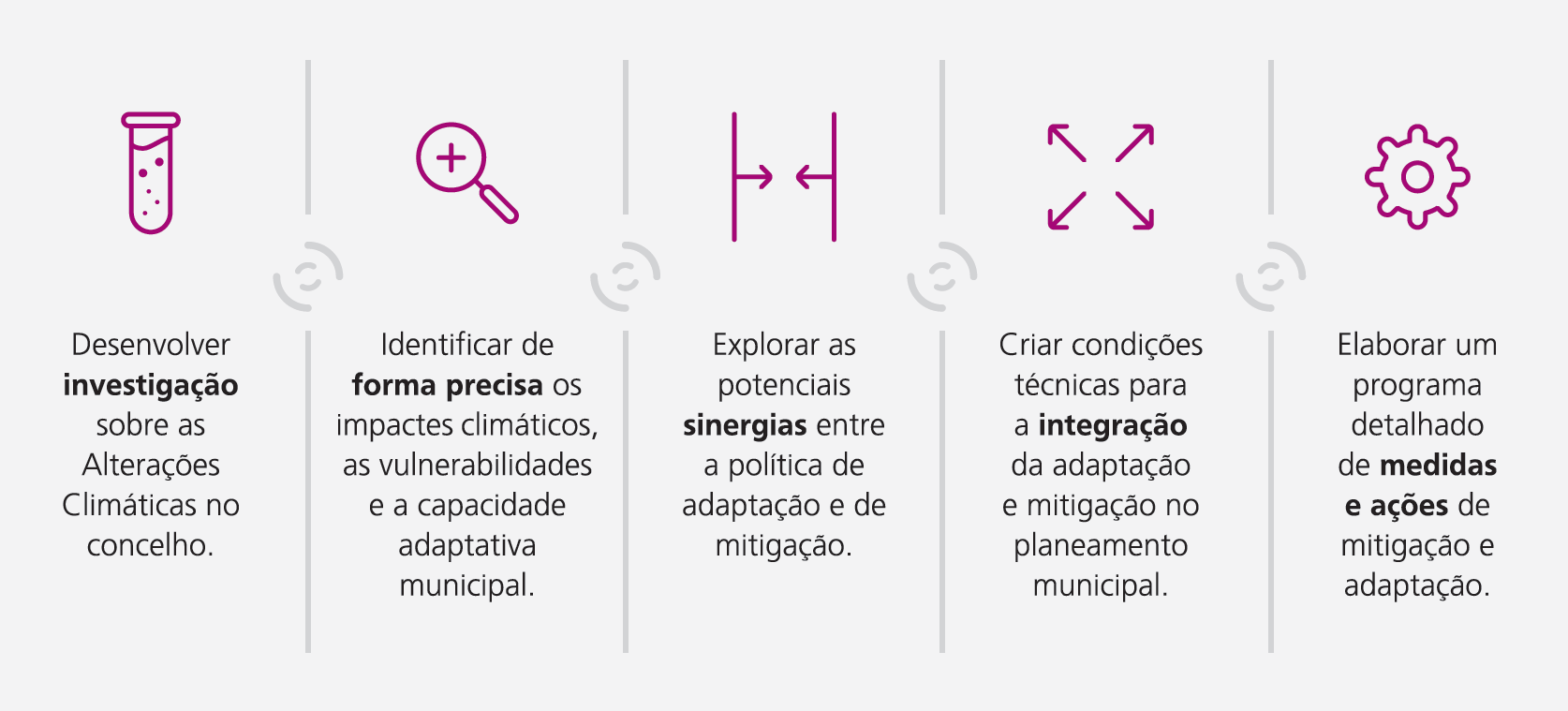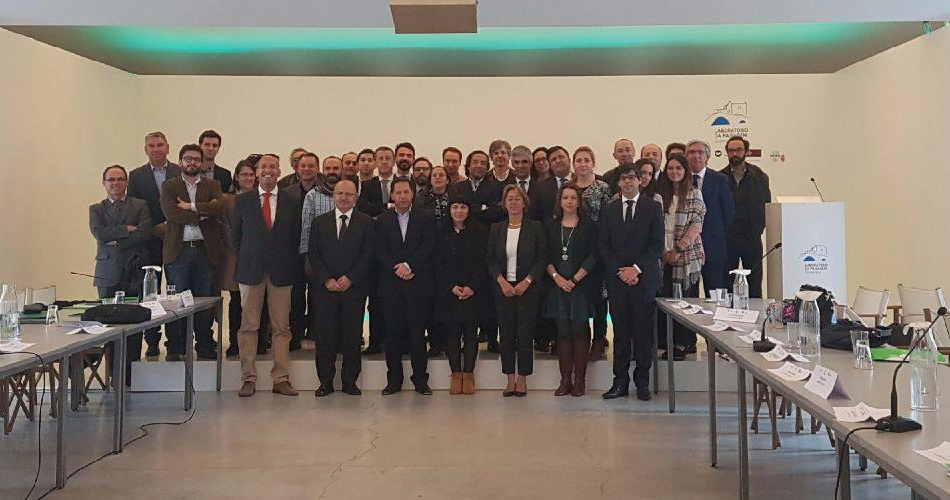
The Loulé Adapta brand was created by the municipality of Loulé to mark and promote the good sustainability practices implemented in the territory and all the initiatives and projects developed within the scope of municipal climate action, stemming from both the Loulé Municipal Strategy for Adaptation to Climate Change (EMAAC of Loulé) and the Loulé Municipal Climate Action Plan (PMAC of Loulé), being, at the same time, a warning and an incentive to change behaviour in search of a more sustainable and differentiated lifestyle.
Get to know the Local Climate Action Policy and Follow Us on Facebook.

The development of Loulé’s Municipal Climate Change Adaptation Strategy (Loulé MCCAS), started in January 2015 within the scope of the ClimAdapt.Local project, aims to promote, throughout the municipal territory, a coherent response to the multiple problems relating with climate change and put the municipality at the forefront of the national stage with regards to these issues.
Loulé’s MCCAS was approved by the municipality on 6th June 2016.
It is not the strongest of the species that survives, nor the most intelligent; it is the one most adaptable to change. Charles Darwin
The development of a conscious, informed and capable municipality in the response to climate change and that incorporates in municipal action and territorial management the factors, threats and opportunities associated with the new climate dynamics.
Loulé’s Municipality Climate Action Plan (Loulé's PMAC) is the planning instrument that structures the municipality’s policy for responding to the challenges of climate change. It is a national pioneer in the way it articulates, on a local scale, the mitigation of GHG emissions, energy efficiency and decarbonisation, with adaptation to current and future climate vulnerabilities, seeking to accelerate local climate action towards a more systemic and prepared response to climate change.
Loulé’s PMAC aims to:

STRATEGIC VISION
Transforming Loulé into a territory that is more resilient to climate change, committed to decarbonisation and the energy transition, following a path of climate action that promotes sustainability and social justice, in consultation with the local community.
STRATEGIC OBJECTIVES (OE)
In order to realise its vision, and in line with the objectives set out at national level in the Strategic Framework for Climate Policy, Loulé’s PMAC establishes 6 major OE for local climate policy:
The main mission of the Loulé Local Climate Action Council (CLA) is to accompany, promote and monitor climate action at local level. Set up in 2017, the CLA must also contribute to stimulating and outlining policies and actions with an impact on adapting to and mitigating climate change, as well as on the sustainable development of the municipality, towards efficient, participatory and lasting climate governance.
Led by the municipality of Loulé, and involving around 85 organisations to date, the CLA is a flexible and inclusive structure, of a consultative nature and on a voluntary basis, which brings together a group of key players and institutions representing civil society, committed to the process of implementing climate action at local level. The CLA is therefore a comprehensive structure for monitoring and supporting decision-making throughout the implementation of the Loulé Climate Action Plan, which will mobilise the local community through the commitment of its key players.
The Loulé municipality’s CLA also includes the dynamisation of thematic working groups (WG) (WG1 - Extreme Events: Coordination and Stimulation of Responses; WG2 - Water: Strategic Resource; WG3 - Energy: Efficiency and Decentralised Production; and WG4 - Desertification: Strategies to Combat Desertification), which has already made it possible to hold various moments of debate and reflection, technical training initiatives and has been the driving force behind a number of ongoing pilot projects, most notably the School Energy Community (a project that aims to implement the production of renewable energy for self-consumption in schools and which includes an educational component, involving training actions for the entire school community).
Consult the Composition and Operating Rules of the CLA Climate Action in the Municipality of Loulé (PT) here.


The adapt.local - Network of Municipalities for Local Adaptation to Climate Change was created in December 2016 as a result of the ClimAdaPT.Local project, in which the beneficiary municipalities of the project, by signing a Letter of Commitment, formalised the creation of an informal partnership led by municipalities and involving other institutions with the aim of boosting local adaptation to climate change in Portugal. In May 2022, adapt.local was formalised as a private, non-profit association, thus strengthening its capacity to act and intervene.
The adapt.local, whose Board of Directors is chaired by the municipality of Loulé, is a non-profit organisation under private law, with an associative nature, open to the participation of municipalities and Portuguese entities of other kinds, namely higher education institutions, research centres, non-governmental organisations and companies. To date, adapt.local has 26 municipalities (full members) that fulfil the membership requirements, namely having an approved municipal climate change adaptation strategy or plan and demonstrably developing, within the scope of their competences, projects and actions relating to local adaptation to climate change, namely: Almada, Amarante, Braga, Bragança, Cascais, Castelo Branco, Castelo de Vide, Coruche, Ferreira do Alentejo, Figueira da Foz, Funchal, Guimarães, Ílhavo, Lagos, Leiria, Lisboa, Loulé, Mafra, Montalegre, Odemira, Seia, Sintra, Tomar, Torres Vedras, Viana do Castelo and Vila Franca do Campo.
Adapt.local’s mission is to promote a continuous process of adaptive planning that increases the capacity of Portuguese municipalities and other public or private entities to incorporate adaptation to climate change into their policies and instruments, affirming the importance of the local scale in designing and implementing more effective, efficient and equitable adaptation solutions.
adapt.local pursues the following tasks and objectives:
Follow adapt.local’s work at: www.adapt-local.pt